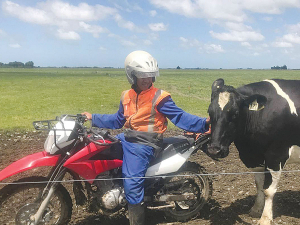State of the Dairy Nation 2024/25: DairyNZ Highlights Record Milk Production and Export Growth
DairyNZ's chief executive Campbell Parker says the 2024/25 dairy season reinforces the importance of the dairy sector to New Zealand.
 Farmers are able to make applications for 150 workers in management roles, and 50 dairy farm assistants.
Farmers are able to make applications for 150 workers in management roles, and 50 dairy farm assistants.
Applications for dairy farmers wishing to gain border class exceptions for migrant workers are now open, say DairyNZ.
The process, which opened on 8 July, would allow 200 dairy farm workers and their families enter New Zealand following the Government’s announcement last month.
Farmers are able to make applications for 150 workers in management roles, and 50 dairy farm assistants.
DairyNZ says it has worked closely with Federated Farmers and the Ministry for Primary Industries (MPI) to ensure the process in place is robust and fair.
The organisation’s Jenny Cameron says opening the applications provided clarity and detail for farmers facing a nationwide staff shortage.
“This will help some of the workers stuck overseas able to return to their jobs on Kiwi farms,” she says. “Or new migrants looking to join the sector, while supporting our farmers by relieving some of the workforce shortage.”
The process opened, initially for two weeks, in order to assess and understand interest from farmers, Cameron adds.
She says that if the 200 exception spaces are not filled in the initial two-week period, applications will remain open.
However, if it is oversubscribed, Cameron told Dairy News that it could signal to the Government that they should consider making more spaces available.
“We understand the urgency of our farmers wanting to get people on-farm, especially as we are entering such a busy time on the farming calendar,” she adds.
“The New Zealand border closures may mean staff are a couple of months away yet due to the application process and booking MIQ space, but this exception process does deliver for the bulk of this dairy season and provides farmers with some options to fill staff shortages.”
According to Government requirements, set by MPI and Immigration New Zealand, those wishing to bring migrant workers into New Zealand must apply to the relevant industry body – in this case, DairyNZ.
There are a total of three categories for dairy farm workers: workers needed for short-term roles, workers needed for long-term roles and workers for an approved class.
Dairy herd managers must be earning more than $79,500 and have 2-4 years’ relevant work experience, while assistant dairy farm managers or 2ICs must be earning above $92,000 with 2-4 years’ work experience.
According to MPI, the maximum visa duration granted under the border class exception is 12 months and workers must enter New Zealand before the end of April 2022.
The Meat Industry Association of New Zealand (MIA) today announced that Chief Executive Officer Sirma Karapeeva has resigned from the role.
The winners of the 2026 Hawke’s Bay/Wairarapa Dairy Industry Awards were announced at the annual awards dinner held at Copthorne Solway Park in Masterton on Thursday evening.
Environment Southland is welcoming this week’s decision by the Environmental Protection Authority (EPA) to approve the release of Blaptea elguetai, a leaf‑feeding beetle that will help control the highly invasive Chilean flame creeper.
This March, the potato industry is proudly celebrating International Women’s Day on 8 March alongside the International Year of the Woman Farmer, recognising the vital role women play across every part of the sector — from paddocks and packhouses to research, leadership, and innovation.
Fruit trader Seeka posted a record profit and returns to shareholders in 2025.
Recent weather events in the Bay of Plenty, Gisborne/Tairawhiti, and Canterbury have been declared a medium-scale adverse event.
OPINION: Staying with politics, with less than nine months to go before the general elections, there’s confusion in the Labour…
OPINION: Winston Peters' tirade against the free trade deal stitched with India may not be all political posturing by the…